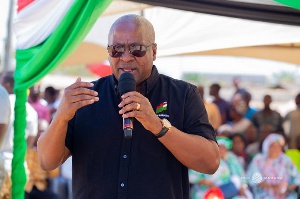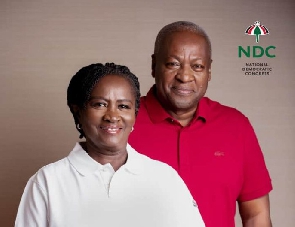General News of Tuesday, 6 November 2018
Source: Michael Creg Afful
Energy Ministry descends on Mahama; says he did not end dumsor
The Ministry of Energy has descended on former President John Dramani Mahama for claiming his administration ended the unbearable power crisis "dumsor" before exiting power in 2016.
Even though the ministry said it is not surprised about the recent desperate moves by the former President in a bid to secure the flagbearer slot of the opposition NDC, the ministry however said it is alarmed by his latest claim of ending dumsor.
"At the time President Mahama left office, the only intervention he made towards addressing dumsor was the expensive emergency power plants he brought in which have led to unwanted excess capacity and heavy financial burden to the state. Contrary to his claim, the deployment of emergency power did not provide the solutions we much needed," a statement signed by the Head of Communications at the Energy Ministry, Nana Kofi Damoah said.
"At the time dumsor reached its peak, Ghana’s installed generation capacity was 3,600 MW against peak demand of 2087 MW. The rapid rise of demand for power from 2087 MW in November 2016 to the current level of over 2,400 MW shows that dumsor could not have ended in 2016 but that there was a substantial residual power demand that is now being met with regular electricity supply. The reality was that the Government had no ideas about how to finance procurement of fuel by VRA to run the existing plants owned by the Republic. They instead piled up debts for the energy sector which stood at $2.4 billion at the time the NDC left office in 2016. They also failed to regularly maintain the existing plants and worse of all, they over-drafted the Akosombo Hydro dam and grossly depleted its capacity to generate power. It must also be noted that the use of the emergency power plants to generate power at the moment is not due to the non-availability of alternative generation plants but due to the take-or-pay obligations the Mahama Government committed the nation to.
"Therefore, we have had to leave our own plants idle to generate power from the emergency plants because we still have to pay for the capacity whether they generate power or not. In spite of high levels of water in the Akosombo Dam, we are still operating three turbines to avoid liabilities of the emergency plants President Mahama brought in. In fact, our thermal plants at Tema and Aboadze run less than 50% of the time because of the same take or pay arrangements," the statement added.
Below is the full statement
GHANAIANS HAVE NOT FORGOTTEN HOW FORMER PRESIDENT MAHAMA CREATED AND LEFT DUMSOR FOR PRESIDENT AKUFO-ADDO.
Former President Mahama lately has been claiming that it was his government that ended dumsor in Ghana.
Whilst we are not surprised at his desperate moves to win the flag-bearer of the NDC with his usual empty rantings, we are alarmed by his latest claim of ending dumsor in the face of the full knowledge of the people of Ghana to the contrary.
Ghanaians cannot soon forget how President Mahama plunged the country into darkness. We wish to remind the former President he, unprovoked, in April and July of 2016 admitted that indeed he had failed to solve dumsor. Even as at end of December, 2015, he forced his then Minister for Power to resign from his post for failing to end dumsor contrary to his promise to do so. This was when former President Mahama shifted his responsibility as Head of State to a Minister who was appointed barely a year before his dismissal. Ghanaians therefore were not spared the dreaded dumsor in 2016 at the time the NDC left office. It is important to set the records straight.
At the time President Mahama left office, the only intervention he made towards addressing dumsor was the expensive emergency power plants he brought in which have led to unwanted excess capacity and heavy financial burden to the state. Contrary to his claim, the deployment of emergency power did not provide the solutions we much needed. We have always known that the problem of dumsor was financial and not shortage of generation capacity.
At the time dumsor reached its peak, Ghana’s installed generation capacity was 3,600 MW against peak demand of 2087 MW. The rapid rise of demand for power from 2087 MW in November 2016 to the current level of over 2,400 MW shows that dumsor could not have ended in 2016 but that there was a substantial residual power demand that is now being met with regular electricity supply.
The reality was that the Government had no ideas about how to finance procurement of fuel by VRA to run the existing plants owned by the Republic. They instead piled up debts for the energy sector which stood at $2.4 billion at the time the NDC left office in 2016. They also failed to regularly maintain the existing plants and worse of all, they over-drafted the Akosombo Hydro dam and grossly depleted its capacity to generate power. It must also be noted that the use of the emergency power plants to generate power at the moment is not due to the non-availability of alternative generation plants but due to the take-or-pay obligations the Mahama Government committed the nation to.
Therefore, we have had to leave our own plants idle to generate power from the emergency plants because we still have to pay for the capacity whether they generate power or not. In spite of high levels of water in the Akosombo Dam, we are still operating three turbines to avoid liabilities of the emergency plants President Mahama brought in. In fact, our thermal plants at Tema and Aboadze run less than 50% of the time because of the same take or pay arrangements.
We wish to also remind the people of Ghana about the recklessness of the Mahama Government in signing more than 30 Power Purchase Agreements. These deals were made in the pretence to solve dumsor. The reality however was that, the power deals were avenues for rent seeking and corruption. It made no sense for the Mahama Government to sign a cumulative 11,000 MW of generation capacity although our peak demand is just about 2400 MW.
These Agreements will also put on the state a huge cost of $7 billion in capacity charges from 2018 to 2030 although most of the plants will not be utilized.
The Government of President Nana Akufo-Addo has however taken the painful decision of terminating 11 of the PPAs at a cost of $402.39 million, whilst others have been deferred, to save the country an annual cost of $586 million. The improvement in the supply of electricity is also due to the NPP Government’s successful arrangement with fuel suppliers for uninterrupted supply of HFO, and the dedicated stock of light crude oil kept by VRA against unexpected shortage of natural gas.
Therefore, unlike the Mahama Government which announced load shedding anytime the FPSO Kwame Nkrumah was shut down or when the West African Gas Pipeline had accidents, there have not been any interruptions in power over the last two years in spite of several shut-downs of the FPSO.
Government’s efforts to have sufficient natural gas from both local and WAGP has resulted in diversity and security of fuel and power supply. We are proud to say that the operations of VRA has improved significantly because of the Government's intervention.
We wish to advise President Mahama to focus on the primaries of his party and not to remind Ghanaians of the mess he created in the energy sector.
The people of Ghana in general and industry in particular cannot soon forget that after stabilizing power supply in the country, the policies of the NPP Government under President Nana Akufo-Addo has in less than two years led to significant reductions in the higher electricity tariffs imposed on them by the NDC government.
For example, the PURC recently announced a reduction in electricity tariffs by 17.5% for Residential consumers, whilst industry and commercial consumers 30% and 25% reductions respectively. This has made electricity more affordable and reduced the cost of production in the country, contributing to the tremendous growth of the economy and lower inflation.











